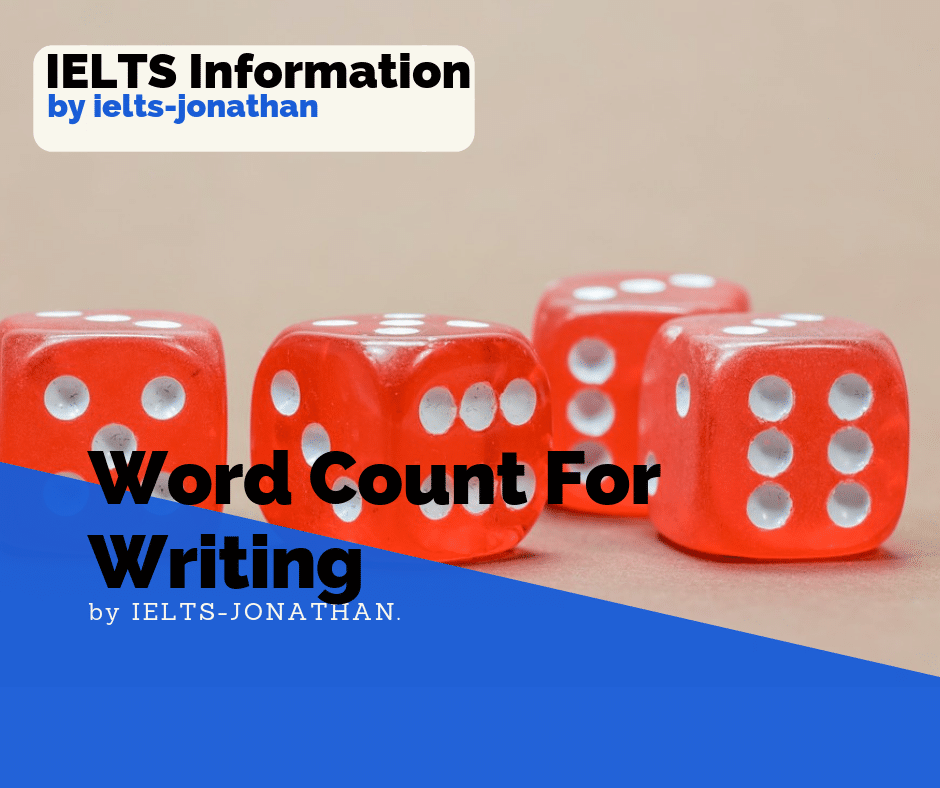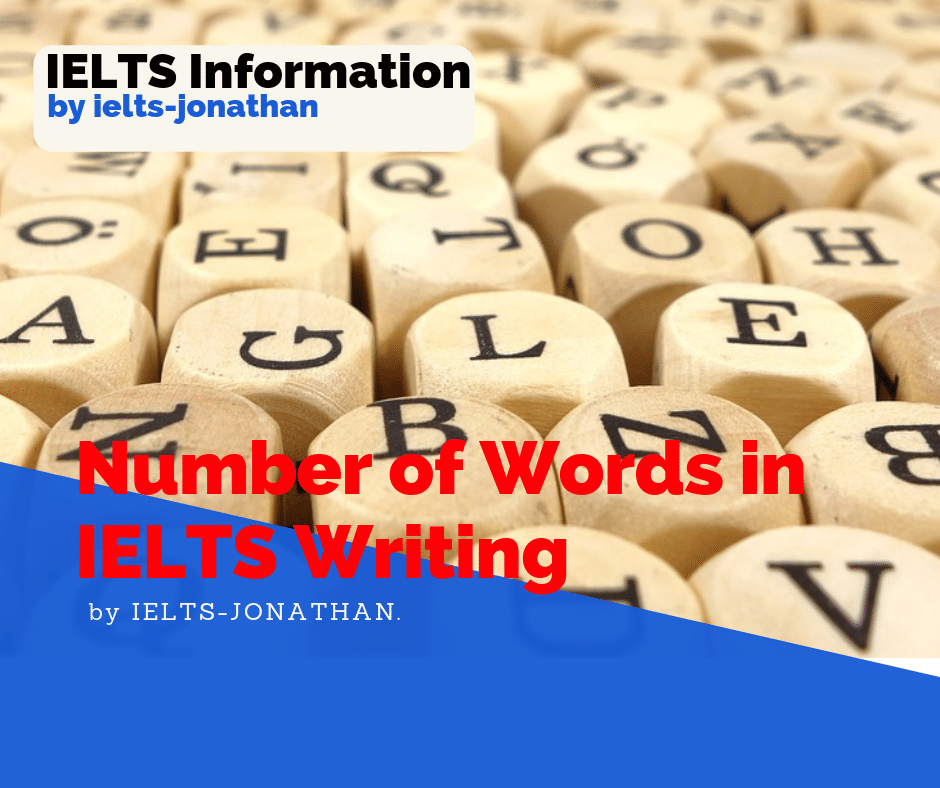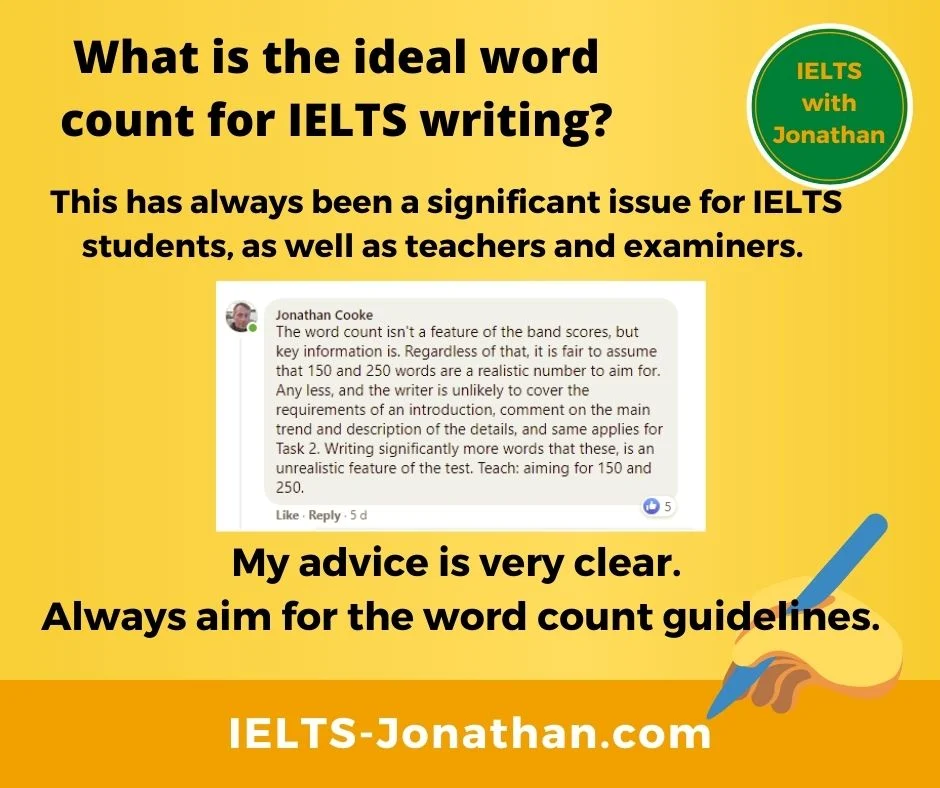What’s the ideal number of words in IELTS writing?
How many words should you write in the 20 or 40 minutes of the IELTS exam?
What is the ideal length of essay or a Task 1 report is an interesting question.
While there has always been a minimum word count, unlike other Cambridge Exam tests, there has NEVER been an upper-word limit in the IELTS exam
The instructions have always been:
Write at least 250 words (for Task 2) OR Write at least 150 words (for Task 1)
So, if 250 and 150 were the minimum number of words, does that make them the ideal word count, or should you be aiming to write more?
Importantly, will you improve your band score with more words?
And, if you do write more, how much more?
Do more words mean a higher score?
These are just some of the questions I am asked online.
Number of words?
So, what’s the correct answer?
Well, on the one hand, you need to write essays and reports that address the task fully in both Task Achievement and Task Response.
This means you need to fully report the key details or, in the case of an IELTS essay, extend your ideas.
On the other hand, you need to have, as much as possible, “error-free sentences” to stand a chance of scoring IELTS Band 7 or above for Grammatical Response and Accuracy.
Unfortunately, writing more words means more sentences, and more sentences generally means more chances for making errors!
Why are there word count guidelines?
Not meeting the word count used to be penalised and was an simple way for examiners to use the IELTS Band Scores.
It was easy to penalise students in their Task Response or Task Achievement by counting the number of words; any report and essay under the word count was limited to a band score of 5.
Unfortunately, this led to teachers actively encouraging students to count their number of words, as if their life depended on it.
It didn’t matter about how well you explained your ideas in an essay, or reported the details of a chart; a low word count meant a low band score.
The truth is there was always a valid reason for stipulating a word count for an essay or report.
Without the minimum word count a student could never really answer a question fully and an examiner could never really examine an essay in the four band scores fairly.
Just by looking at TA and TR, a report needs and overview and key features and an essay needs an extended answer.
Are the words counted now?
If you write an IELTS test on paper, you will find that it is marked on a computer somewhere in the world. Gone are the days where test papers were marked in house, in the test centre and examiners spent their afternoon counting words and awarding a score.
A remote examiner will look at papers and be able to gauge whether an task has enough content.
The computer based test gives you an automatic word count, for a very good reason; to help you consider if you have extended your answer or reported key details.
So while the words are no longer counted and there are no longer guidelines, it is up to the examiners discretion whether the content is sufficient to cover the TA or TR.
What if I write significantly under the word count?
Remember I’ve said that a remote examiner is able to “gauge the content of a task“.
If you are significantly under the word count, your writing is likely to draw negative attention.
The remote examiner will start look for missing key features – or whether you have justified you ideas in an essay. This can affect and lower your score.
There examiner will also consider whether enough vocabulary and grammar has been presented and what justification this has on your IELTS writing score.
So you can see there are a number of valid reasons for aiming to be above the minimum number of words.
What happens if I write a very long report or essay?
Sadly, I’ve seen essays which go to the extreme and significantly exceed the word count.
An examiner never penalises a piece of writing because of it length, but much like an under-length task, it will draw negative attention.
In this case, the opposite is true:
One issue with extending an essay and providing too much evidence can affect the progression and cohesion of the essay and led to repetition.
Remember, you only have 40 minutes and if the writing is not planned and concise, then coherence can be affected.
An additional problem might be that too much writing leads to too many mistakes and not enough time to check and correct them.
Finally, in my experience, longer reports and essays tend to have a negative backwash on the examiner.
No one enjoys reading more than they really have to, especially if it needs to be reread again and again because of confused or poorly planned writing.
This can and will lead to a lower band score.
When I guide students, I offer this advice.
My word count guidelines for an IELTS TASK 2 Essay
In order to write an essay that extends that argument sufficiently for Task Response, my experience tells me that 280 to 300 words is probably high enough a word count.
Anymore than this and you run the risk of being be off topic, of repeating your ideas or including irrelevant details.
In fact it is always better to try and write concisely. This means writing and saying as much as you can in as few words and sentences.
When you are thinking about the word count, ignore the essays that you find on-line, including mine.
Those essays were not written within 40 minutes and were not timed either.
I read essays posted on other websites littered with mistakes and lacking coherent ideas or general sense.
If you look on this website, you will find over-length essays. They took look a lot of time and thought to write and then check and proofread.
They are only posted here to provide exemplars of vocabulary, grammar and topic ideas.
My advice is: do not aim to write more than 300 words for an IELTS Task 2 essay.
Word count guidelines for a Task 1 report
The same advice applies to a Task 1 report.
There is absolutely no reason to write extensively in Task 1.
A maximum of 200 words should be the limit to avoid repetition or avoid including irrelevant details.
Often 150 to 180 words is enough to cover the task in all areas and so when you practice, just aim for this figure.
Word count guidelines for a General Task 1 Letter
For a letter task you are given bullet points.
As a guide, Task achievement requires that all the bullet points in the prompt are dealt with in the letter you write.
Concise is the key word again, but think about who you are writing to, the purpose and the content you include.
Think about the letters you might have received in the past. How do you feel if you have to read a long letter?
If you are writing over 200 words, maybe you are writing too much?
Writing a180 words should be enough to avoid repetition or avoiding irrelevant points and details.
What about Native speakers taking IELTS?
Writing to these guidelines also allows sufficient time to check your writing for errors at the end if you write at an average speed.
However, stronger students, native speakers or students at C1 or C2 level, could probably write more than this and still have good control of grammar, vocabulary and ideas.
But is it really worth the extra effort?
The rule still applies, the more you write, the more mistakes you will probably make, which is why it is often a good idea to limit the length of your response.
Long responses can often become repetitive or go off-topic, which affects your band score negatively.
I’ve always told my IELTS students that, in IELTS writing, every word counts and should only add value to your essay.
It is my belief that this will only add to your band score.
I’m Jonathan
I’ve taught IELTS and University English in more than a dozen universities and schools around the world.
I’m a parent, traveller and passionate about language teaching and helping students achieve their dreams.
Whilst living in Austria or working in Asia, I run IELTS courses to help students get to where they want to be.
If you are serious about IELTS, connect with me to see how I can help you.






Was this helpful? Leave a comment :)